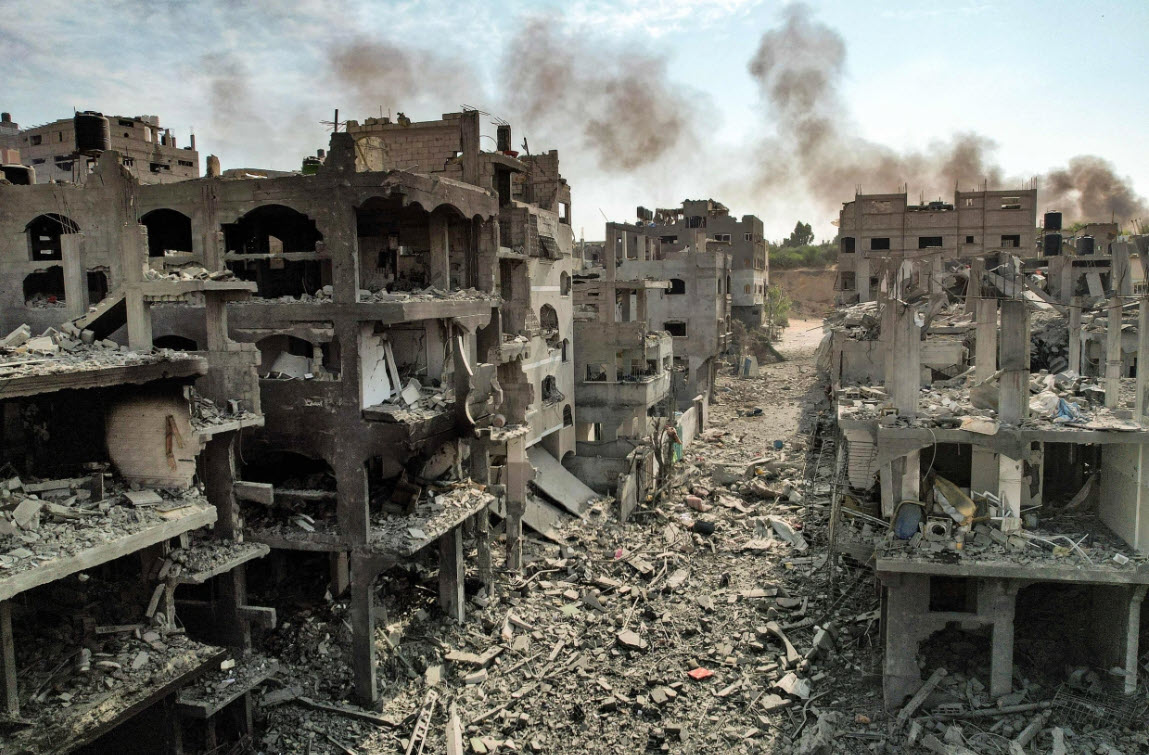Will Israelis Finally Get Rid of Netanyahu?
< foreign policy|141|40|>
The attacks on Israel have exposed the true nature of Hamas. In previous attacks, Hamas barrages of low-grade and homemade rockets did little damage and few Israelis were killed. In retaliation, Israel shattered Gaza with airstrikes killing 
The mother and immediate family of a 23-year-old daughter
killed at Kibbutz Be’eeri near the Gaza border.
vast numbers of civilians to earn accusations of war crimes from human rights groups for their disproportionate slaughter. In the 2008-09 Israel-Gaza War, the death toll was an estimated 1,166-1,417 Palestinians and 13 Israelis. In 2014 it was 2,205 Palestinians, at least 1,483 of them civilians according to the U.N., and 71 Israelis, almost all soldiers.
It was a vastly different outcome for Israel this time, 1,300 Israelis savagely killed at this writing by a Hamas that revealed themselves to be bloodthirsty barbarians who have proved themselves to be even more evil that ISIS. The list of their atrocities is unspeakable; we’ve seen depravity beyond anything one could have imagined that needs no repeating here.
Israeli retribution will be worse this time. Ostensibly to avoid killing civilians, Israel Defense Forces have called for half of Gaza’s 2.1 million people to evacuate the northern half of the narrow 25 mile long strip with nowhere to go but to live in the streets of the southern half, penned in with neither means to escape nor find shelter. Israel has chosen to commit its own humanitarian atrocity by depriving the Palestinian citizenry of food, water, fuel, and electricity, creating the war crime of collective punishment of all for the actions of a few. Israeli Defense Minister Yoav Gallant called all of them “human animals”.
The media will cover the war; we’ll try to be useful gathering other reporting.
Netanyahu’s catastrophic policy
The immediate reaction was that Israel’s celebrated intelligence services had colossally failed to foresee the attack. Certainly true, but the larger question is whether it is Israel Prime Minister Benjamin Netanyahu and his hard-right coalition that caused Israel to be so unsuspecting and unprepared.
Netanyahu has billed himself as the security guarantor for Israel, referring to himself as “Mr. Security”. But he has been obsessed with his months-long campaign to strip the Israel Supreme Court of its power so as to “realize the strongman dream” which is “becoming personally untouchable by the law”, as New York University historian Ruth Ben-Ghiat surmises. He would rid himself of charges of bribery, fraud, and breach of trust in a trial that could otherwise convict him in a few months.
His attempt to end the check-and-balance democracy has fractured Israeli society. Thousands have been protesting in the streets for forty weeks. It has fractured the military as well. Army an Air Force personnel have said they will not fight for a dictator, leading many to resign their reservist status. The Hamas attack has doubtless set those objections aside, pro tem, but they speak to the erosion of morale that led to failed combat-readiness.
Backed by his hard-right coalition, Netanyahu no longer disguises his aggressive intentions of building ever more settlements in the West Bank. Some in his rightwing cabinet have called for outright annexation of the territory. A piece at Vox focuses on Netanyahu’s finance minister, Bezalel Smotrich, who has promoted a policy of oppression and rapid expansion of settlements as the best path to break the will of Palestinians. Instead it has given rise to an increase of lethal incidents between 
Buildings destroyed by Israeli airstrikes in the Jabalia camp for Palestinian refugees in Gaza City.
Palestinians and Jewish settlers. Over 250 Palestinians have been killed this year by settlers and the occupying army, far more than Israelis killed.
More troops were needed to quell the unrest.
“There was a need for more soldiers, so where did they take them from? From the Gaza border, where they thought it was calm …[N]ot surprising that Hamas and Islamic Jihad noticed the low staffing at the border”
said Aharon Zeevi Farkash, the former head of the Israel Defense Forces’ military intelligence. Military units had been shifted despite warning signs. The Gaza border was left minimally manned.
Gazan media had disclosed that Hamas and Islamic Jihad militants had been training for weeks near the Israeli border, according to reporting by Noga Tarnopolsky, a correspondent covering Israel and Palestine, and Shira Rubin, a reporter for The Washington Post in Tel Aviv. This was apparently ignored, as was the danger of the approaching 50th anniversary of the Yom Kippur War as what might be an incendiary moment. Tarnopolsky and Rubin said a columnist wrote last month in the right-wing newspaper Israel Hayom of the “good news” that “neither Israel nor Hamas want to see hostilities escalate, each for its own reasons”.
guaranteed to provoke
A major initiative, heavily supported by the United States, was afoot to normalize relations between Israel and Saudi Arabia as a bulwark against Iran. For Hamas and Hezbollah in Lebanon on Israel’s northern border, both of which get money and weapons from Iran, the link-up between Israel and the Saudis is seen as seen as a strategic threat.
To derail the Israel-Saudi détente, invasion of Gaza is exactly what Hamas wants, with no regard for the safety of Gazan citizens. They knew that attacking Israel would provoke an explosive response against Gaza such that Saudi Arabia would have to back away from any alliance in protest over the destruction and killing of fellow Arabs. The Israeli people demand revenge for the Hamas butchery, but they are following the Hamas playbook by invading Gaza.
Moreover, as part of the deal, the Saudis were to demand concessions for the Palestinians in the West Bank and even withdrawals of some of the Jewish settlements there that would revive prospects for a two-state solution. That is anathema not only for Hamas but for Netanyahu as well. A columnist at Israel’s Ha’aretz newspaper unearthed evidence that BiBi has intentionally bolstered Hamas rule in Gaza as an ally against any two-state movement. He has injected cash into Gaza and made provision for impoverished workers to come through the fence checkpoints to work day jobs in Israel. At a 2019 Likud party meeting, Netanyahu reportedly said
“Anyone who wants to thwart the establishment of a Palestinian state has to support bolstering Hamas and transferring money to Hamas. This is part of our strategy — to isolate the Palestinians in Gaza from the Palestinians in the West Bank.”
That has not been confirmed as an exact quote, says Vox writer Zack Beauchamp, but he quotes others in Netanyahu’s circle who have said the same.
war on two fronts
In the north, there have already been exchanges of rocket fire across the Lebanon-Israel border with deaths on both sides. Israelis have been advised to head south away from danger. Tens of thousands of Israeli reservists are streaming to the northern border.
Hezbollah, the quasi military group, waits in Lebanon to see how severe will be Israel’s invasion of Gaza. The demand that the northern half of Gaza’s population evacuate to theor south with nowhere to go — all gates locked, a million people condemned to live for how many days in the streets of south Gaza with neither food nor sanitation — that barbarity might constitute the “go” signal for Hezbollah, its forces far exceeding Hamas in military power. Hezbollah forms part of the Lebanese government so conflict with Israel internationalizes the war.
Fearful of this, and of Israel’s inability to fight a war on two fronts, Biden has ordered the aircraft carrier USS Gerald R. Ford to sit off the coast, its fighter jets presumably poised to interdict. For any element thinking of making a move, Hezbollah or otherwise, Biden memorably had one word of advice: “Don’t”.
The $6 billion question
In the U.S., Republicans, already incensed over the Biden administration’s transfer of $6 billion to Iran, doubled down when Iran-backed Hamas struck Israel, saying that Biden paid for the invasion. “Those that are propagating this are either ignorant or knowingly lying to the American people to advance political objectives”, was Hagar Chemali’s reaction. Now spokesperson for the US mission to the UN, she had worked with such programs when at Treasury. First, this money went from South Korea to Qatar, she explained; second, none of it has been transferred to Iran; third, it will only be spent on humanitarian needs — food, medicine, and such, She spelled out the procedure: Qatar reviews requests along with the US, orders the goods, and ships to Iran, which never sees the money.
Lost in the rush to accuse was why there was $6 billion of Iranian funds sitting in South Korea.
In 2018, President Trump ‘s administration renewed sanctions against Iran to prevent their selling oil on the world market. But he issued waivers to half a dozen countries to allow them to continue buying Iranian oil temporarily, South Korea among them. The president did so because “I don’t want to drive the oil prices in the world up”. When the waiver expired, South Korea had run up $6 billion in oil buys. So it was Trump who allowed the Iranians to earn the $6 billion, but Biden is taking the heat.
contrary Collegians
Protests — not against the Hamas massacres but against Israel — erupted on college campuses across the US. It came as a shock that our youths could condone or justify such depravity by ignoring it and showing concern for only Palestinians. More worrisome long term is that it brought to the surface the depth of animosity that has quietly built up against Israel beyond any degree heretofore realized.
While successive administrations in Washington profess “iron-clad” support for Israel as Defense Secretary Lloyd Austin just said, having flown to Israel along with Secretary of State Antony Blinken; while Israel is constantly referred to as our ally, with how that benefits us never elucidated, which costs us $3.8 billion in annual aid, more than any other country; while we are constantly told it is the only democracy in the Middle East, as if that absolves bad conduct, our college students have come to see Israel very differently. They see a country that has militarily occupied Palestinian lands for over a half-century, restricting movement with checkpoints, and denying a people’s right to self-determination. They see a country that has steadily been usurping Palestinian lands with settlements. They see Israeli government coalition now dominated by orthodox Jews and Zionist fanatics that want Palestinians expelled altogether into Jordan, what in Israel is called “the transfer”.
There is the danger that the criticism of Israeli policies could easily spill over into anti-Semitism, which we may already be seeing in these protests, and Israel doesn’t help by being quick to brand any criticism of their country as anti-Semitism. Netnayahu and the extreme right parties that form his coalition have been disastrous for his country. His promise to “manage” Hamas has failed dreadfully.
Tom Friedman, who has covered Israel and the Palestinians for 50 years and is a New York Times columnist says of Netanyahu,
“This man is the number one person responsible for this failure in Israel. What he has done has been one of the greatest abdications of leadership in the history of the Jewish state.”
Protests against him continue in Tel Aviv. Noga Tarnopolsky reports that a week into the war, Netanyahu has made no attempt to contact the families of hostages. There are numerous calls for him to resign.
